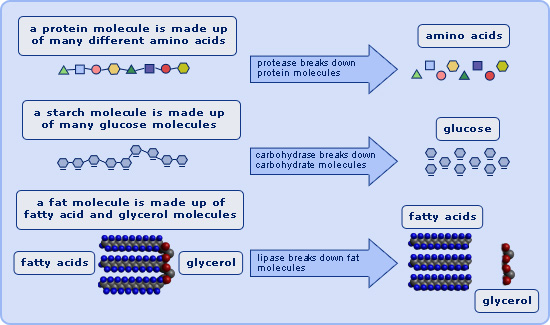Enzymes and Digestion
As we know enzymes are important molecules, they are particularly important in digestion as they help break down large, insoluble food molecules into small, soluble molecules which can be easily absorbed. Enzymes work best at their optimum pH. So for example if the stomach does not produce enough HCl, the enzyme, pepsin, will not work properly, (remember the optimum pH for pepsin is 2).
There are 3 main types of enzymes in our gut: Protease, Carbohydrase, and Lipase.

Protease
Protease enzymes are secreted by the stomach, pancreas and small intestine and their job is to digest proteins. An example of a protease is pepsin which is secreted in the stomach. Proteins are long chains of amino acids, and protease enzymes break them into peptides (smaller chains of amino acids molecules) and eventually into individual amino acids, which are small and easily absorbed in the small intestine. The word equation for the protease reaction is:
proteins ![]() amino acids
amino acids
Carbohydrase
Carbohydrase enzymes are secreted by the mouth, pancreas and small intestine. The carbohydrase enzyme, amylase is secreted by the mouth and found in saliva. It starts to work as soon as we begin to chew our food. Amylase digests long, complex starch (polysaccharide) molecules, into smaller, simpler maltose (disaccharide) molecules. As maltose is a disaccharide it still needs further digestion before it can be absorbed. The enzyme maltase breaks it down into glucose. The word equation is:
starch ![]() maltose
maltose ![]() glucose
glucose
Other dietary sugars such as sucrose and lactose (both disaccharides) are broken down further by different carbohydrase enzymes. The word equations are:
sucrose ![]() glucose + fructose
glucose + fructose
lactose ![]() glucose + galactose
glucose + galactose
Lipase
Lipase is secreted by the pancreas and the walls of the small intestine. It digests complex fat (or lipid) molecules into simple, soluble fatty acid and glycerol molecules. The word equation for this reaction is:
Lipids ![]() fatty acids + glycerol
fatty acids + glycerol
Summary Table of the Digestive Enzymes
| Digestive enzyme | Produced in | Reaction catalysed |
|---|---|---|
| Protease (e.g. Pepsin) | Stomach, pancreas and small intestine | Protein |
| Carbohydrase (e.g. Amylase) | Salivary glands, pancreas and small intestine | Starch |
| Lipase (e.g. Gastric lipase) | Pancreas and small intestine | Fats (lipids) |
